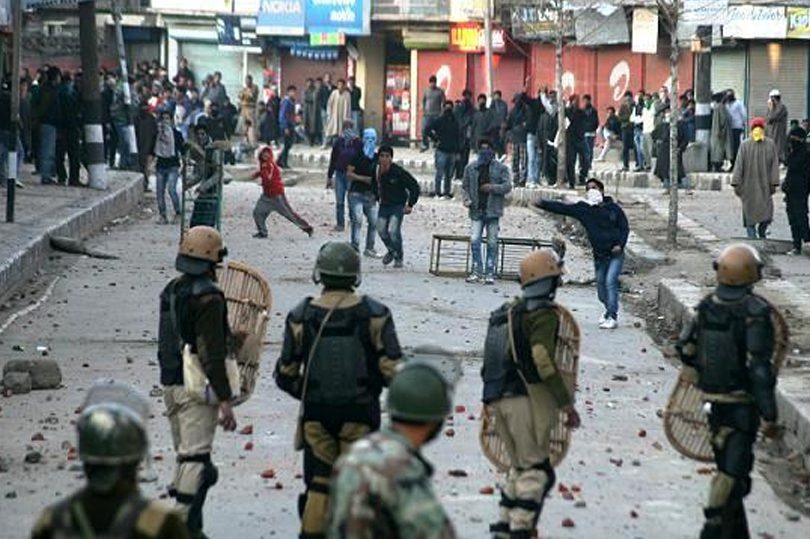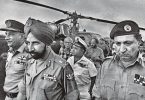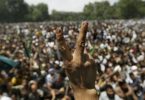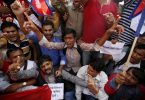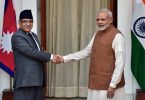In May 2014, the Bharatiya Janata Party (BJP) secured a historic victory in Indian general election. For the first time in three decades, a single political party was able to achieve a majority in the Indian Parliament. Following this, the BJP focused its attention towards the election of Indian-occupied Jammu and Kashmir (IoJK). The BJP came to the IoJK with the promise of development. The party runs its election campaign titled as ‘Mission 44+’, the number of seats required to secure a majority in the IoJK Assembly. During its election campaign in the IoJK, the BJP leaders promise their voters that all West Pakistani refugees (WPRs) who migrated from Sialkot and other parts of Pakistan in 1947, 1965 and 1971 to the IoJK will be granted permanent citizenship. However, granting of permanent resident rights in IoJK to outsiders is not permissible according to the J&K State Subject law.
Contrarily, the People’s Democratic Party (PDP) run its election campaign by highlighting the bad governance and dismal human rights track record during the government of Jammu and Kashmir National Conference (JKNC) for the past six years. In addition, the party was also claiming to be the sole party that can counter BJP’s entry in IoJK. On the other hand, leaders of All Parties Hurriyat Conference (APHC) appealed the Kashmiri people to boycott the election. Despite several calls for boycott, Indian media claimed that the voter turnout for the 2014 IoJK election was the highest recorded in the last 25 years. Following the conclusion of the election, the PDP emerged as the largest party with 28 seats, BJP got 25, JKNC was able to grab 15 whereas Congress managed to secure 12 seats in the 87-member assembly.
The PDP was formed by Mufti Sayeed and his daughter in 1999 after leaving the Congress. Some disgruntled leaders of JKNC and Congress also joined the new party. In the next three years, the party emerged as a strong contender to the JKNC. In the 2002 IoJK election, the PDP was able to grab 16 seats. The PDP came to power together with Congress in 2002, with Mufti Sayeed as the CM. During his first tenure, Srinagar-Muzaffarabad road was opened for cross-border travel and trade. In addition, the J-K Police’s Special Operation Group (SOG), a fearful counter-insurgency force of police, was disbanded. His tenure was seen as a golden period on developmental front.
Both PDP and BJP, after rejecting JKNC’s offers for government formation, officially started talks a week after the announcement of the results. Both teams were represented by the two-member team to form a Common Minimum Programme (CMP). Naeem Akhtar and Haseeb Drabu were representing the PDP while BJP was represented by Ram Madhav and Nirmal Kumar Singh. Minister of State (MoS) in the Prime Minister office (PMO), Jitendra Singh, supervised the dialogue between both parties.
Omar Abdullah resigned as the CM of IoJk on 24 December 2014. The IoJK governor accepted his resignation but asked him to continue in an interim capacity till the formation of the new government. The President’s rule was imposed in the IoJK on the first day of 2015.
The dialogue between the PDP and BJP ended on 18th February 2015, two months and five days after the beginning of the talks. On 25th February, both parties announced that the CMP was almost ready. BJP president Amit Shah and PDP President Mehbooba Mufti, in a joint press conference, stated that ideological differences had been ironed out and both parties were now working on the formation of a cabinet.
The new PDP-BJP government assumed the power on 1st March with PDP’s Mufti Mohammad Sayeed as the CM for the full term of six years and Nirmal Kumar Singh as Mufti Sayeed’s deputy. 12 cabinet ministers from each party were also sworn-in. With the assumption of power, BJP becomes a coalition partner of the IoJK’s government for the first time. The PDP also agreed to join the National Democratic Alliance (NDA)’s central, with Mehbooba Mufti’s induction into the union cabinet. The party also decided to support the Modi’s government in the parliament. Later, Mufti Sayeed and his deputy released the ‘Agenda of Alliance’, the CMP of the two parties. Both parties agreed:-
- To work out a one-time settlement for the WPRs
- To extend all benefits accruing to the people living in LoC to the people living on the International border
- To support and strength the Union Government in its approach to normalizing relations with Pakistan
- To maintain status quo on all constitutional provisions regarding IoJK
- To thoroughly review the security situation in the state with a view to examine the need and desirability of all the special laws being applied to the state
The ‘Agenda of Alliance’ clearly indicate that both parties have adopted the ‘give and take’ approach in order to reach a consensus. The document does not mention granting of permanent citizenship to the WPRs which was promised by the BJP during its election campaign. In addition, the BJP, a vocal about the abrogation of the Article 370 which grants special status to IoJK, also had to stick to present position on constitutional provisions regarding the IoJK. Apart from the BJP, the PDP, which sought “de novo examination” of issues relating to notifying of ‘Disturbed Areas’ in order to pave way for withdrawal of Armed Forces Special Powers Acts (AFSPA), was also not able to do away with the draconian AFSPA, Indian Parliament acts which grants special power to Indian Armed Force, and could not also agree on the timeframe to revoke the law.
The rift between both parties began to show on the first day of the government when the new elected CM of IoJK credited Pakistan and Hurriyat for smooth conduct of elections. The statement by Mufti Sayeed did not go well with the top brass of BJP who disassociated itself from Sayeed’s comments.
As part of a reconciliation effort, the new IoJK government released Masarat Alam. This decision of Sayeed’s government also did not go well with the BJP, whose legislators in IoJK demanded immediate arrest of Alam. Indian Prime Minister Modi also clarified that Union Government was not consulted before taking the decision of releasing Alam. However, Alam was re-arrested by Sayeed government on the pretext that in a rally organized to welcome Syed Ali Gilani in Srinagar some youths waved Pakistani flags.
In coming months, the BJP opposed engaging Hurriyat leaders in negotiations. The Sayeed government also faced communal tensions over the issue of cow slaughter. Despite promises and announcements of economic reconstruction, the IoJK failed to fully rehabilitate and compensated the people of the IoJK for their losses due to the September 2014 floods. In addition, Mehbooba Mufti, who frequently visited the families of freedom fighters before the elections to offer her condolences and sympathies to the bereaved, stopped visiting the families of freedom fighters which gave an impression that she shed ‘crocodile tears’ to strength vote bank for her party.
Before his death, Mufti Sayeed said that his last wish was peace between Pakistan and India. He said the reason for forging an alliance with the BJP was to realize the dream of peace between the two countries. He was hospitalized on 24 December due to sepsis, decreased blood counts and pneumonia. He later died on 7th January 2016 due to multiple organs failure.
Following the death of Mufti Sayeed, Governor’s rule was imposed in the IoJK as both coalition partners did not stake a fresh claim for government formation. Initially, both parties maintained that Mehbooba was not in the position to assume the post of the CM as she was mourning the death of her father. After the mourning period was over, the PDP said that it was looking for assurances and CBMs from the Centre on the implementation of ‘Agenda of Alliance’ before forming the new government. The deadlock ended after Mehbooba met Modi on 22nd March. On 2nd April, IoJK Governor NN Vohra invited Mehbooba to form her government. On 4th April, Mehbooba Mufti made history by becoming the first female CM of the IoJK.
The 57-year-old Mehbooba Mufti entered into mainstream politics by joining the Congress in 1996 along with her father. She has been credited with the growth of her party. She won acceptance from people due to frequently visiting the families of the martyred freedom fighters, voicing her concern over human rights violations and calling for the resolution of the Kashmir issue. She won her first IoJK election on Congress ticket from Bijbehara. Later, she played a key role in her father’s victory as Congress candidate in the 1998 general elections. She also played a vital role for her party during the 2002 IoJK polls. Most of the areas from where PDP won, during the 2002 polls, were the same areas where Mehbooba had extensively campaigned. In 2004, she won her first Lok Sabha seat from south Kashmir.
Nirmal Singh was to continue as the deputy CM. In addition, the BJP also gained two more Cabinet-rank ministers increasing its tally of ministers to eight. On 23rd April, Mehbooba said that both Pakistan and India should start a new era of peace and prosperity in the region similar to how the US and Iran recently ended hostilities and started a new phase of engagement.
Hopes and Expectations from Mehbooba Mufti
Mehbooba Mufti is the first woman chief minister of Jammu & Kashmir as the head of the coalition government of People’s Democratic Party and Bhartiya Janta Party. Certainly, Ms. Mufti faces stern challenges after taking the charge of the state. Jammu & Kashmir has been badly polarized particularly after the recent events of beef ban and flag controversy apart from the volatility that has struck the valley since long. Though many analysts are of the few that Mehbooba has good association with the masses on the ground, however only time will tell how she will live up to the task.
The future of the state politics surely stands to be the most credible challenge for Mehbooba Mufti. To begin with the ideological impasse between the coalition partners, PDP and BJP regarding the issue of autonomy will be a point of contention, with PDP demanding for considerable autonomy while BJP making attempts to do away with even the perforated one that is in existence today. That economic and infrastructure development are in no way substitute to political autonomy with latter being the demand of masses as well and at the core of J&K issue, how will Mehbooba Mufti bargain with its coalition partners on such an intricate issue to gain credibility among the masses is certainly a daunting challenge.
Ms Mufti has also greatly pitched for peace between Pakistan and India. However, Prime Minister Narendra Modi has time and again ruled out any possibility of making Kashmiris party to the talks over the dispute. With this categorical exclusion of the state of Jammu & Kashmir and its representatives from the dialogue process primarily against the wishes and expectations of the local populace, one certainly is bound to question the credibility of the talks. Likewise, Mehbooba Mufti now being the representative of people’s opinion has an important role in voicing the demands of the masses so that any framework of dialogue process does not disregard in any way the aspirations of Kashmiris.
The issues of people of J&K are diverse. The use of force by the Indian security forces with impunity, massive human rights abuses committed under the draconian AFSPA law, killings and torture which continue to subjugate the people is the gravest of all problems which has gone unaddressed till date. The rise of communal incidents in Kashmir in the recent past targeting Muslims, the high rate of unemployment, addressing the issue of land grabbing by the Indian forces, the issue of missing persons, indeed Mehbooba Mufti will have to take into consideration all these paradigms for the betterment of people of Jammu & Kashmir to ensure peace and prosperity in the region.
Over the past month, Jammu & Kashmir has experienced a new phase of turmoil and violence which started with the alleged molestation of a minor girl on April 12 by an Indian Army officer in Handwara. The desperate screams of the minor girl alerted the general public gathering an infuriated unarmed mob to protest against the molestation and demanding arrest of the army man. In no time curfew was imposed in Srinagar, mobile service was halted and in various incidents of firings carried out by the Indian Army two young men and a woman was killed while dozens were injured. The victim, a sixteen year old girl, was detained by the police while her family was barred to meet her. Later, a video of the girl surfaced online filmed by Indian forces, exonerating the army. The girl was given no legal counsel while her statement was recorded. Jammu and Kashmir Coalition of Civil Society (JKCCS) which was approached for legal assistance was barred by forces denying the victim her legal rights. The statement of the minor girl was obviously recorded under duress and influence and was legally unjustifiable. For over a month the girl was kept in a protective custody against her will, shifted to an isolated place and movement was greatly restricted. Likewise JKCCS has also been impeded to carry out necessary investigations and pursue the case of the victim. However, when it comes to Jammu and Kashmir, the Indian security forces have a history of heinous and inhumane crimes against the people. The situation that proceeded following the uprisings in Handwara, the death of five unarmed protestors, the removal of the Indian flag and the burning of the rifle bunkers in Handwara once again pointed out to the essential issue that continues to worsen the Kashmiri conflict – massive human rights violations carried out by the occupying forces which continues to be the foremost cause of the violence.
A new chapter of bloodshed has been written with the assassination of Burhan Wani on 8th July 2016. The blatant use of force against both unarmed peaceful protestors and innocent civilians by Indian occupation forces have ignited protests both inside India and outside as well. The issue is complicated, between people struggling to ensure their basic human rights, sanctity and safety against the roguish forces of the occupying power. Amidst this how will the administration of Jammu & Kashmir ensure that the perpetrators of violence are brought to task would indeed be a tough call for Mehbooba Mufti.
It would not be wrong to mention however, that elections in Kashmir are usually a farce while hopes and expectations of people are always met with empty promises. When it comes to witnessing political drama in Kashmir, certainly the elections of 1987 get the first mention. The elections of 1987 undermined the faith of Kashmiris in the ballot box. While most elections in Kashmir are usually rigged, the distinctive feature of this election was that that the Indian state coupled the electoral fraud with violence. The fateful election gave rise to an armed struggle and Kashmiris experienced worst kind of violence in the ensuing years including fake encounters, custodial deaths, torture, rape, enforced disappearances and what not. Certainly one can hope to believe that the political scenario of Kashmir would have been different had the Indian state sincerely conducted free and fair elections. Evidently every fresh election in the Indian Occupied Kashmir entails beating the same old drums – revocation of AFPSA, PSA, dispensation of justice, spurring economic growth etc. The current administration also followed the suit. From participation in elections to holding peaceful demonstrations, Kashmiris have tried every bit of it in their struggle to achieve peace. Given the record, elections conducted under the supervision of the Indian government are always devoid of required transparency. However as the struggle of Kashmiris continue, responsibility rests with the political leadership of India, Pakistan and Jammu and Kashmir to make sincere efforts to bring peace in the region.
Challenges to Peace in the Valley
The conflict of Kashmir is a complex amalgamation of religious, nationalist and political factors deeply rooted in history. The conflict itself has contributed to extreme volatility in the region and now when both – Pakistan and India – possess nuclear weapons, Kashmir has rightly been declared as the nuclear flashpoint of the world. The conflict remains at the center of security and foreign policy of both India and Pakistan extracting heavy toll in terms of blood and material from them. On the contrary, the people of Kashmir remain disenfranchised and dehumanized under Indian occupation. Their sufferings are countless.
For peace to initiate and sustain there are required some starters. Willingness of the parties to initiate the peace process, clear intentions of the leaders involved, necessary political will to sustain the process of negotiations, creating an environment conducive for negotiations, cessation of hostilities and propaganda are some of the most essential requirements for the peace process to commence and endure. The Kashmir dispute however is always short of the necessary political will and requisite elements to begin the dialogue process. For instance, by using the pretext that Pakistan high commissioner held meetings with Hurriyat leaders of Kashmir, India’s BJP government called off the secretary level talks with Pakistan in 2014 which certainly raised questions regarding the intentions of the Indian government to merely initiate let alone sustain the dialogue process. Likewise, the recurrent unprovoked aggression by the Indian security forces along the working boundary further mounts up tension between the two states thereby undermining probabilities, if any, of peace process.
Given the trajectory of Kashmir conflict, dialogue along the conflict lines is also greatly delimited, which impinges transformations reason being little and irregular contact between people in both the countries as well as with the people of Kashmir. The seemingly interruptible dialogue between Pakistan and India which excludes Kashmiris from any discussion table despite their important role in the process certainly makes the entire process hostage to shortsighted political gains and vested interests. While Pakistan has always been an ardent supporter of associating the Kashmiri representatives in the dialogue process, India has frequently accused Pakistan of interfering in the Indian held Kashmir (IHL). Moreover, the grievances of Kashmiris are not met constructively given the loopholes in judicial and administrative system and lack of transparency on the part of the government leaving them to aggravate and grow into desperation. Indian government has adamantly failed to recognize its role in deteriorating the situation in Kashmir. Human rights violations are categorically denied and rights organizations are forbidden access. The blame is consistently heaped on Pakistan with little or no mention of India. Such acts are instrumental in demonizing peace constituencies on both the sides of the border.
Owing to their differing security perceptions by virtue of the asymmetry in terms of power and capability where the bigger and ambitious neighbor time and again resorts to unfriendly postures certainly contributes to distrust and suspicion between India and Pakistan which acts as another major impediment in the peace process. Likewise, adverse images and opinions have frequently been used to morph public opinion in favor of vested interests of fundamentalists on both the sides of the border. As a matter of fact, the rise of Hindu militant nationalism has further complicated the situation which has in the recent times exploited every gesture aimed to accelerate the process of negotiations.
Way Forward
Although there have been several viable solutions on the table and many have also been discussed at official and unofficial meetings but none have received their consensus. Considering the obstinacy of India, it is certain that policy pursuits of India are the main hindrance in the resolution of the process. International community should therefore apply their influence on New Delhi to keep it engaged in the dialogue process.
A Peace process is usually periodic, yielding benefits in phases, essentially two steps forward and one backward. In this context the primary challenge to peace process is conflict management. The vital aim of negotiations is to move from the phase of violence to politics to manage the otherwise outstanding conflict. In a way, conflict management reduces pressure for conflict resolution while containing implicit potentials for conflict resolution in the next step. Thus to begin with, authorities in Pakistan and India can focus their attentions on conflict management, reducing the negative aspects of the conflict while injecting the positive ones. The initial step shall be in this regard to address the grievances of the victims. Excessive human rights abuses in this conflict demand for a venue to provide justice to those who have suffered. As long as people have this feeling that they have been wronged and that justice has not been meted out to them, it is likely that they might channel this frustration into more desperate measures. Thus providing a legal avenue to people to augment their voice is the most important goal and for this a bigger responsibility rests with the government of Mehbooba Mufti to effectively voice the concerns and sufferings of the people and the Indian administration to uphold its international commitments with respect to international human rights treatise and customary international law.
With over 60 years of stalemate in the conflict it is quite certain that the only way forward is through dialogue instead of relying on the use of force particularly following the induction of nuclear weapons in the region. Likewise, for such a dialogue process to produce optimal results parties should come forward with a flexible approach, vision to discuss options and ability to make compromises. Currently, it seems as if India lacks such a vision and is therefore trying its utmost to not only evade any options of negotiations on Kashmir but is also employing measures to keep the issue in a limbo. Equally important is that any such dialogue process shall not in any way disregard Kashmiris as a vital party to the conflict. Instead, Kashmiris must be integrated into the peace process through a wider process of consultation with the civil society and political groups. For Pakistan and India to overcome the trust deficit, confidence building measures at official and unofficial level can help effect a new process by overcoming the stumbling blocks for an eventual agreement. This will in turn help to target substantive issues particularly demilitarization and implementation in letter and spirit of 2003 LOC ceasefire agreement.
At the moment it seems has if Pakistan and India are far from reaching a lasting solution and that future is bleak. But solutions do exists. It is just a matter of political will to create a framework for peace, provide necessary support to a sustainable peace process and agree to a mutually expectable solution. The resolution of the issue of Kashmir is important not only for Indo-Pakistan relations but for the prospects of South Asian region as well.



